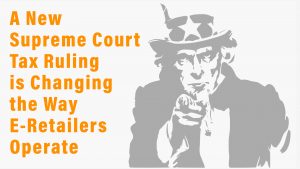online sales tax
A new Supreme Court tax ruling is changing the way e-retailers operate, and it may negatively affect Amazon third-party sellers depending on what states they operate out of.
This ruling, which came into effect on June 21, questioned a South Dakota law imposed in 2016 that required any company (online or otherwise) that delivers over $100,000 worth of goods or handles over 200 in-state transactions will have to pay sales tax, regardless of where that company is located.
 In supporting this law with a 5-to-4 vote, the Court gives states an individual right to collect taxes from internet sales.
In supporting this law with a 5-to-4 vote, the Court gives states an individual right to collect taxes from internet sales.
While this decision does not impose the rigid thresholds that South Dakota has set, it allows states to set their own laws, which the U.S. Government Accountability Office suggested could flood the economy with anywhere between $8 and $13 billion for states nationwide.
The Council of Shopping Centers suggested that the figure may be even higher, with an estimate of $26 billion.
In making this decision, the Supreme Court overturned a previous ruling from 1992 that limited taxes on e-retail sales. Considering that online shopping over two decades ago was not anything near what it is today, state representatives and companies alike have been clamoring for a change to a seriously outdated law.
How Does This Ruling Affect Online Retailers?
Online retail has long been considered a top-notch shopping option for many due to the convenience and low prices that many online retailers can afford to sell at.
However, this ruling levels the playing field for major retail corporations that were unable to compete with their online counterparts low prices due to the sales tax they had to endure.
“Retailers have been waiting for this day for more than two decades,” the National Retail Federation told CNBC.
“The retail industry is changing, and the Supreme Court has acted correctly in recognizing that it’s time for outdated sales tax policies to change as well. This ruling clears the way for a fair and level playing field where all retailers compete under the same sales tax rules whether they sell merchandise online, in-store or both.”
In the immediate aftermath of the ruling, stock at many e-retailers took a hit. Overstock suffered the most, falling 5.7 percent. Etsy and EBay took approximately a 2 percent tumble. Meanwhile, Amazon’s stock fell just under 1 percent.
Conversely, traditional retail giants such as Target, Best Buy and Walmart all saw their stock increase by about 1 percent.
“Today’s ruling will give every retailer the opportunity to compete on a level playing field without the government’s thumb on the scale – that’s a win for all those who believe in free markets,” said general counsel Deborah White from the Retail Industry Leaders Association.
“For the consumer, this means an increasing array of options both in-store and online, with competition for their business based on price, service, selection and value – not special tax treatment.”
While it seems that this would spell bad news for Amazon, the company is actually the most prepared of any major online retailer, which shows once again how Jeff Bezos continuously stays one step ahead of the competition.
Amazon has prepared itself by collecting sales tax in every state on all products that it sells directly, without third-party engagement.
Considering the company sells about half of its products directly, the court ruling is unlikely to affect price changes on any of Amazon’s flagship items.
Other online retailers may be in a bit of a bind after the ruling, however, due to the lack of sales tax collection in states that they do not physically operate out of.
John Swain, a law professor at University of Arizona, told CNBC, “Amazon should be helped [by the ruling] because it is collecting sales tax in every state, while it is the Wayfairs of the world who are directly hurt.”
These companies, such as Wayfair and Overstock, may suffer a great deal due to this ruling, which could cause their prices to go up and might lead to more customers flocking to Amazon should their prices remain consistent.
How Will this Online Sales Tax Ruling Affect Sellers?
While Amazon has been prepared with taxes on their direct transactions, the other half of all Amazon products are distributed by third-party sellers who may not have been paying sales tax in states they ship products to.
Considering the precedent set by South Dakota of taxing distributors regardless of where the company is located, sellers in states where there is no statewide sales tax such as Delaware, Oregon, Alaska, Montana and New Hampshire will not be able to hide behind their state’s tax laws.
Since there is no standard approach set, sellers will be in wait-and-see mode regarding the new laws that states will be proposing regarding taxes on e-retailers.
In essence, it is unclear at this time exactly how heavily sellers will be affected. Depending on what they sell and what states they typically distribute to, this ruling could barely affect some sellers and be detrimental to others.
Paul Rafelson, a law professor at Pace University, suggested that the Supreme Court is “punting” on the questions regarding third-party sellers.
“Amazon can hide behind its marketplace to claim tax exemption because it’s still going to pretend it’s not a retailer – and not responsible for collecting sales taxes,” Rafelson said.
“There’s still a lot of legal questions that need to be answered. There’s no commonality in the way the states do it. Congress needs to standardize this stuff because otherwise, it gets out of control.”
Rafelson makes a good point that this issue could get out of control depending on what some states do. If states get too extreme in looking for more tax dollars, it could put some third-party sellers out of business or cause them to stay away from selling to customers in said states.
Some states such as Pennsylvania, Washington and Minnesota already require major online retailers to collect sales tax from their third party sellers, but other states have left this up to the sellers themselves, which creates a tricky grey area in the meantime.
While sellers may be scrambling to figure out what taxes they have to pay, Amazon offers a tax calculation service in exchange for a 2.9 percent fee on the value of the taxes. Due to this service, Amazon may end up making even more money due to these state taxes, while third-party sellers will suffer as a result.
Sellers should do their best to figure out these taxes themselves rather than being charged for convenience sake.
While questions loom about exactly what will happen with sales tax on third-party sellers, many are up in arms suggesting that Congress should set a standard approach on how to tax online sellers. With each state having their own sales tax requirements, sellers who operate in multiple states will need to be mindful of the changing laws that will occur in the near future.

Author: Online Sales Tax
Cyril Zackary Penn IV is a soon-to-be graduate of Hofstra University with a Journalism degree from Sonoma, California. He started his own blog in high school and has been writing about sports, news and entertainment since. He is currently a staff writer at AXcess Baseball as well as the Hofstra Chronicle and formerly was the Sports Editor at Man of the Hour Magazine.